Microsoft Office 365, with its comprehensive suite of tools, offers SMTP services for users to send and receive emails. However, as Microsoft moves toward enforcing stricter security protocols like Multi-Factor Authentication (MFA) and phasing out basic SMTP methods, businesses and individuals are searching for reliable alternatives that meet their specific needs.

This article explores Office 365 SMTP alternatives and offers insights into selecting the best service for your organization.
Table of Contents
Pricing
| Trail Plan | Standard Plan | Premium Plan | Professional Plan |
| $50 | $145 | $185 | $225 |
| Sending Limit | Sending Limit | Sending Limit | Sending Limit |
| 1000 Emails/Hour | 1500 Emails/Hour | 3000 Emails/Hour | 5000 Emails/Hour |
Why Look for an Office 365 SMTP Alternative?
Office 365 SMTP has traditionally been a go-to for many organizations. However, recent changes and specific limitations are driving businesses to seek alternative solutions. The key reasons for this shift include:
- Enforcement of MFA (Multi-Factor Authentication): Microsoft is increasing the security of its services by enforcing MFA for its users. While this is a positive step toward securing email accounts from unauthorized access, it complicates email-sending processes for businesses using legacy systems that don’t support MFA. Systems that rely on traditional SMTP authentication methods might not work with Office 365 anymore without MFA compliance.
- Limitations on Email Volume: Office 365 SMTP is not optimized for high-volume email campaigns. Microsoft imposes limits on the number of emails you can send per day, which can be restrictive for organizations that rely on mass email marketing or need to send transactional emails in bulk.
- Cost: Office 365, while robust, can be an expensive solution for smaller businesses or startups. The cost of maintaining Office 365 licenses, especially when you only need it for SMTP purposes, may not be justifiable when compared to other more affordable SMTP services.
- Legacy Systems: Many organizations still operate legacy systems that do not support the modern security protocols enforced by Office 365. These systems require basic SMTP for sending emails without the added security layers, creating compatibility issues.
- Technical Constraints: Integrating Office 365 SMTP with various custom applications or systems may pose technical challenges, especially for organizations with unique infrastructure needs or custom-built applications that are better suited to a different SMTP provider.
Given these concerns, exploring Office 365 SMTP alternatives can help businesses maintain email functionality while bypassing the limitations of Office 365.
7 Best Office 365 SMTP Alternatives
Numerous SMTP service providers can effectively replace Office 365’s SMTP functionality. Below is a detailed breakdown of some of the most popular alternatives:
1. iDealSMTP
iDealSMTP is designed with bulk email senders in mind. It offers a user-friendly interface and focuses on high deliverability, making it an excellent choice for organizations looking to send large-scale email marketing campaigns or transactional emails. Unlike Office 365, iDealSMTP is optimized for high-volume use and is tailored for small to medium businesses.
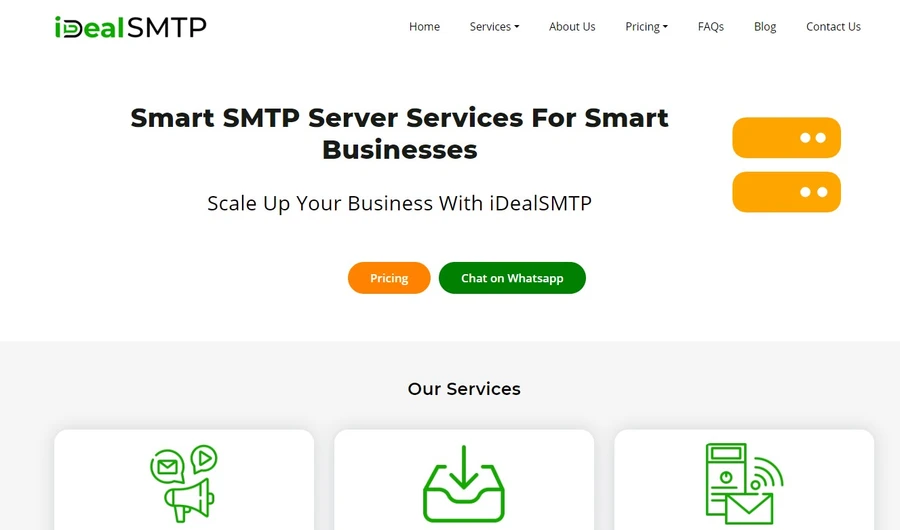
Key Features:
- Customizable sending limits to meet your business needs.
- Provides real-time analytics to monitor the success of your email campaigns.
- Supports SPF, DKIM, and DMARC for improved email authentication.
- Easy integration with major platforms such as WordPress, WooCommerce, and custom applications.
Pros:
- Affordable pricing, especially for businesses that send a high volume of emails.
- High deliverability rates, ensuring your emails make it to the inbox.
- User-friendly interface, making it easy to manage large email campaigns.
Cons:
- Lacks some advanced features like A/B testing and advanced analytics.
- Limited API capabilities compared to providers like SendGrid.
Best For: Small to medium businesses that need an affordable, high-deliverability SMTP solution.
2. SMTPget
SMTPget is another excellent Office 365 SMTP alternative, especially for businesses focusing on mass email marketing. With features tailored toward improving email deliverability and managing high-volume campaigns, SMTPget ensures that your emails are delivered efficiently without landing in spam folders. It is especially useful for businesses running frequent email campaigns.
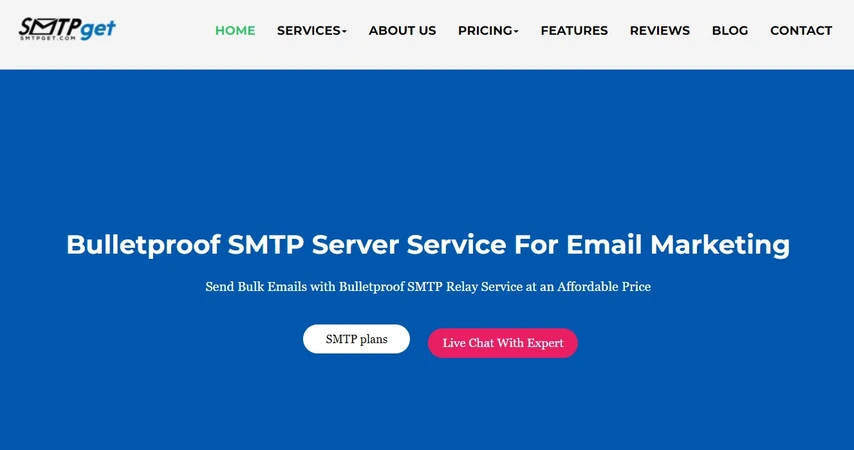
Key Features:
- Advanced SMTP relay services designed for high email throughput.
- IP reputation management to maintain high deliverability rates.
- Easy API integration for developers.
- Comprehensive customer support for onboarding and troubleshooting.
Pros:
- Excellent for businesses that send large volumes of emails.
- Highly scalable and customizable for different email-sending needs.
- Offers advanced deliverability solutions, including dedicated IPs and IP warming.
Cons:
- Pricing may be higher for small businesses that don’t require high email volumes.
- Fewer advanced marketing features compared to competitors like SendGrid.
Best For: Companies that focus on high-volume email campaigns and need reliable deliverability.
3. SMTPmart
SMTPmart is an emerging SMTP service provider known for offering reliable and cost-effective email solutions. It focuses on delivering high email throughput while ensuring deliverability and security. SMTPmart is designed for businesses that require mass email marketing solutions and transactional email services with minimal downtime.
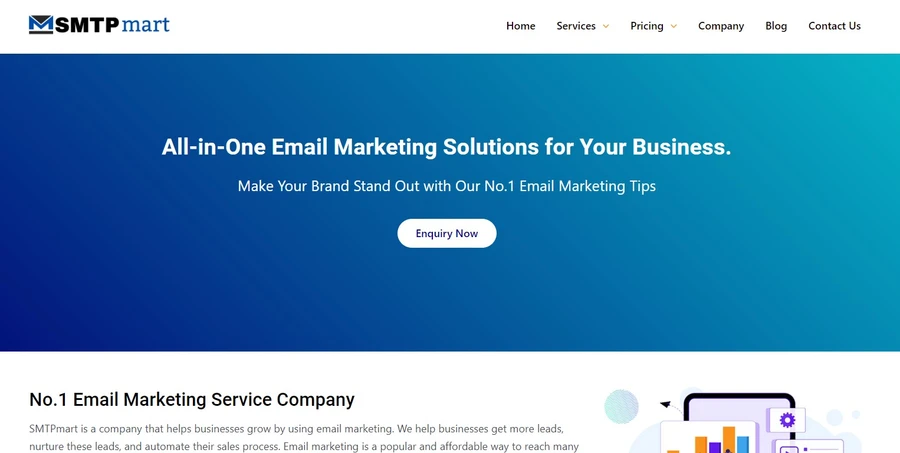
Key Features:
- Provides bulk email services with high email-sending limits.
- Offers dedicated IP addresses for better control over email deliverability.
- Enhanced security features like SPF, DKIM, and DMARC for email authentication.
- Supports email analytics to monitor open rates, bounces, and click rates in real time.
- Simple integration with email marketing platforms like MailChimp and WordPress, as well as custom applications.
Pros:
- Affordable and flexible pricing plans, making it accessible for small businesses and startups.
- High deliverability rates due to dedicated IPs and reputation management.
- 24/7 customer support to help with onboarding, troubleshooting, and optimization.
- Scalable options for businesses that need to ramp up their email-sending capabilities.
Cons:
- Lacks some advanced features for marketing automation compared to more established players like SendGrid or Mailgun.
- API documentation may be less extensive for developers looking for in-depth customization.
Best For: Small to medium-sized businesses that need a reliable, cost-effective bulk email solution with a focus on high deliverability and strong customer support.
4. Amazon SES (Simple Email Service)
Amazon SES is part of the Amazon Web Services (AWS) ecosystem and is known for its reliability and affordability. It offers both SMTP relay and API integration, making it a highly flexible option for developers and businesses. With Amazon SES, you can send transactional and marketing emails at a fraction of the cost of Office 365.
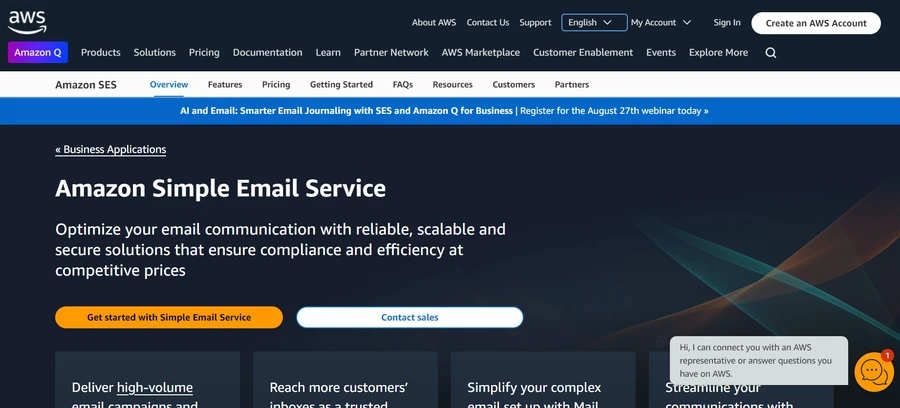
Key Features:
- Low-cost, pay-as-you-go pricing model.
- Seamless integration with other AWS services like Amazon S3, EC2, and Lambda.
- Excellent deliverability rates due to Amazon’s global infrastructure and reputation.
- Provides SPF and DKIM authentication, along with bounce and complaint feedback.
- Built-in analytics to track email performance metrics like open rates, click rates, and bounces.
Pros:
- Highly affordable, especially for high-volume users.
- The ability to integrate with AWS services enables automation and scalability.
- Exceptional deliverability and email management features.
Cons:
- Can be complex to set up without prior AWS experience.
- Lacks some of the marketing-specific features found in competitors like SendGrid or MailChimp.
Best For: Developers, large businesses, and companies already using the AWS ecosystem.
5. Mailgun
Mailgun is another robust alternative to Office 365 SMTP. Known for its easy integration with developer platforms, it offers powerful APIs that support sending, receiving, and tracking emails at scale. Mailgun is particularly popular with developers and tech-savvy users who need full control over their email-sending infrastructure.

Key Features:
- Powerful email-sending infrastructure with built-in validation and routing features.
- Provides detailed logs, analytics, and tracking for every email sent.
- Integrates easily with most major platforms, including custom web applications.
- Strong security features, including SPF, DKIM, and DMARC for better email authentication.
Pros:
- Excellent API support, making it highly customizable for developers.
- Built-in analytics and tracking help optimize email campaigns.
- Scalable pricing plans to accommodate businesses of all sizes.
Cons:
- More complex setup than simpler solutions like iDealSMTP.
- Costs can add up quickly if not managed properly.
Best For: Developers and tech-savvy businesses that need advanced email infrastructure and customization options.
6. Postmark
Postmark is a transactional email service known for its simplicity and reliability. It is optimized for sending transactional emails, such as password resets, order confirmations, and other time-sensitive messages. While not designed for bulk email marketing, Postmark is an excellent alternative to Office 365 SMTP for businesses that rely on high deliverability for transactional emails.
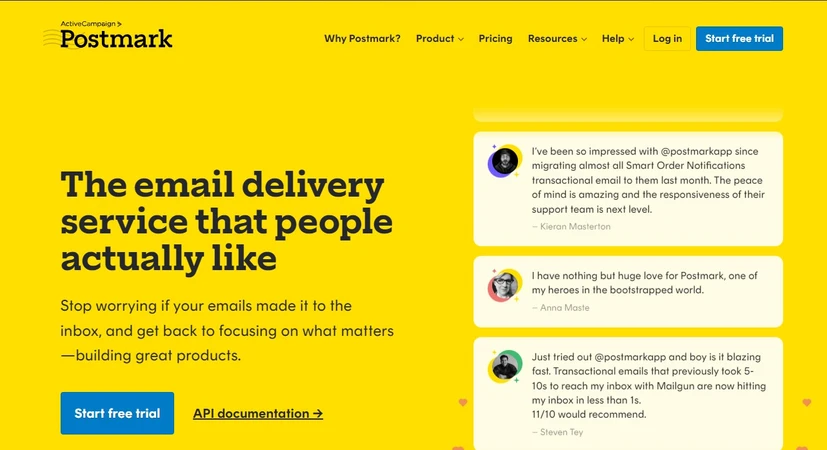
Key Features:
- High deliverability rates for transactional emails.
- Detailed real-time analytics to track email delivery and performance.
- Provides SPF and DKIM for enhanced email authentication.
- Focuses on speed, ensuring that transactional emails are delivered immediately.
Pros:
- Extremely reliable for transactional emails.
- Easy to set up and integrate with most platforms.
- Strong focus on security and deliverability.
Cons:
- Not designed for bulk email marketing.
- Limited customization options for email templates.
Best For: Businesses that prioritize reliable and fast delivery of transactional emails.
7. SendGrid
SendGrid is a cloud-based SMTP service that has gained a reputation for its flexibility, scalability, and ease of use. SendGrid is widely adopted by developers and marketers alike for both transactional and marketing emails. Its robust API, strong deliverability, and user-friendly dashboard make it a highly competitive alternative to Office 365 SMTP.
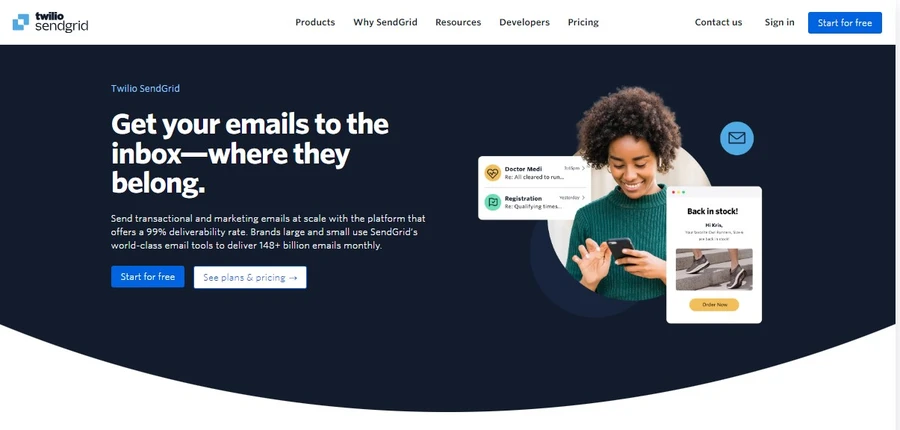
Key Features:
- Seamless SMTP integration and a powerful API for sending bulk emails.
- Advanced email analytics, allows you to track open rates, clicks, and bounces.
- Excellent deliverability with the help of IP warm-up features, ensuring that your emails land in the inbox and not the spam folder.
- Provides SPF, DKIM, and DMARC for email authentication, adding an extra layer of security.
- Easily customizable email templates and workflows.
Pros:
- Scalable for businesses of all sizes, from startups to enterprises.
- Offers detailed analytics to monitor campaign performance.
- Provides a free tier for small businesses or development projects.
Cons:
- Some features, such as IP warm-up, are only available in higher-tier pricing plans.
- Non-technical users may find API integration slightly complex.
Best For: Businesses that need a scalable, cloud-based solution with excellent deliverability and advanced email tracking.
Factors to Consider When Choosing an SMTP Alternative
Selecting the right SMTP service depends on your specific needs, infrastructure, and email volume. Here are key factors to consider:
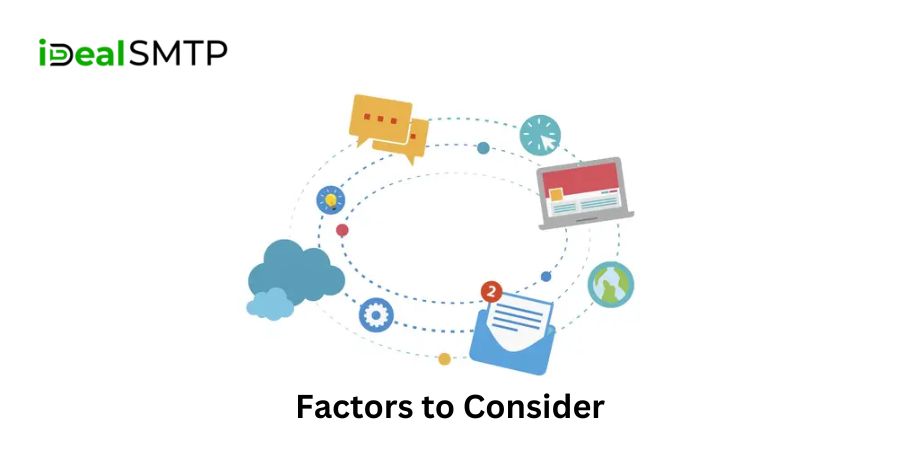
- Email Volume: If your business sends thousands of emails daily, you’ll need a service that scales accordingly. Providers like SendGrid, Amazon SES, and SMTPget are optimized for high-volume sending, making them ideal for businesses with large email marketing campaigns or frequent transactional emails.
- Security Features: Email security is paramount in today’s world. Ensure your chosen provider offers robust security features, including SPF, DKIM, and DMARC. These authentication methods ensure that your emails are legitimate and prevent them from being flagged as spam.
- Deliverability: High email deliverability is critical for ensuring that your emails reach the intended recipients’ inboxes rather than getting caught in spam filters. Providers like iDealSMTP and SMTPget focus on deliverability through IP warm-up, reputation management, and anti-spam measures.
- Cost: Compare pricing models carefully. Services like Amazon SES offer pay-as-you-go pricing, making them cost-effective for high-volume users, whereas others like SendGrid and Mailgun offer tiered pricing based on the number of emails sent.
- Ease of Integration: Depending on your technical setup, ease of integration might be crucial. Services like SendGrid and Mailgun offer robust APIs for developers, while iDealSMTP and SMTPget provide simpler interfaces for non-technical users.
- Customer Support: Strong customer support can be essential for troubleshooting and resolving issues. Look for providers that offer comprehensive customer support, especially if you’re managing high-volume email campaigns or complex infrastructure.
Conclusion
As Microsoft moves towards enforcing MFA and phasing out basic SMTP authentication, finding a suitable alternative to Office 365 SMTP becomes essential for businesses of all sizes. From cost-effective options like Amazon SES to scalable solutions like SendGrid and iDealSMTP, there are numerous alternatives available that cater to varying needs.
Ultimately, the right choice depends on your email volume, technical requirements, and the level of support you need. By selecting a provider that aligns with your business goals, you can ensure smooth, secure, and reliable email communication without the limitations imposed by Office 365 SMTP.







